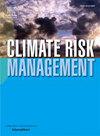Does livelihood risk matter in disaster preparedness? Insights from flood risk areas of rural China
IF 5
2区 环境科学与生态学
Q1 ENVIRONMENTAL SCIENCES
引用次数: 0
Abstract
Farmers in flood-risk areas are exposed to disruptions in their daily production and livelihood operations. However, disaster preparedness can reduce risk and minimize household losses, thereby increasing livelihood sustainability for farming families. Although sustainable livelihoods and disaster preparedness of farmers have been categorized, few studies have explored the correlation between livelihood risk and disaster preparedness. This study examines survey data from 540 farming family households in the three counties Gaoxian, Jiajiang, and Yuechi, which are affected by floods. We consider four distinct types of livelihood risks faced by farmers and three categories of disaster preparedness in the study area and construct a Tobit regression model to test the correlation between livelihood risk and disaster preparedness. The results show (1) a significant correlation between livelihood risk and disaster preparedness among farmers; (2) health risk is positively correlated with farmers’ physical preparedness; (3) social risk is negatively correlated with farmers’ physical, knowledge and skills, and overall disaster preparedness; and (4) financial risk is negatively correlated with farmers’ overall disaster preparedness. Our findings may assist in disaster preparedness and in policy formulation pertaining to flood risk management.
生计风险在备灾中重要吗?来自中国农村洪涝风险地区的洞察
洪水危险地区的农民的日常生产和生计活动受到干扰。然而,备灾可以减少风险,最大限度地减少家庭损失,从而提高农民家庭生计的可持续性。虽然可持续生计与农民备灾已被分类,但很少有研究探讨生计风险与备灾之间的相关性。本研究以高县、嘉江、岳池三县受洪水影响的540户农户为调查对象。考虑研究区农民面临的四种不同类型的生计风险和三种不同类型的备灾,构建Tobit回归模型检验生计风险与备灾之间的相关性。结果表明:(1)农户生计风险与备灾之间存在显著相关;(2)健康风险与农民身体准备程度呈正相关;(3)社会风险与农民身体素质、知识技能和整体备灾能力呈负相关;(4)财务风险与农户整体备灾能力呈负相关。我们的研究结果可能有助于灾害准备和与洪水风险管理有关的政策制定。
本文章由计算机程序翻译,如有差异,请以英文原文为准。
求助全文
约1分钟内获得全文
求助全文
来源期刊

Climate Risk Management
Earth and Planetary Sciences-Atmospheric Science
CiteScore
8.20
自引率
4.50%
发文量
76
审稿时长
30 weeks
期刊介绍:
Climate Risk Management publishes original scientific contributions, state-of-the-art reviews and reports of practical experience on the use of knowledge and information regarding the consequences of climate variability and climate change in decision and policy making on climate change responses from the near- to long-term.
The concept of climate risk management refers to activities and methods that are used by individuals, organizations, and institutions to facilitate climate-resilient decision-making. Its objective is to promote sustainable development by maximizing the beneficial impacts of climate change responses and minimizing negative impacts across the full spectrum of geographies and sectors that are potentially affected by the changing climate.
 求助内容:
求助内容: 应助结果提醒方式:
应助结果提醒方式:


